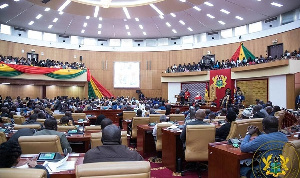Vigilantism Bill finally passed into law

The Vigilantism and Related Offences Bill, 2019 has finally been passed by Parliament after corrections were effected on Clause 7 (3) of the Bill.
Parliament first passed the bill last Monday, but it rescinded the passage following a motion moved by the Majority Leader, Mr Osei Kyei-Mensah-Bonsu, that the sentencing of the offence should be 10 years and not five years, as captured by Clause 7 (3) of the bill.
Bill amendment
After the amendment of the bill, the Minister for Planning, who is also the Member of Parliament (MP) for Wenchi, moved the motion on behalf of the Attorney General for the third reading and passing of the Vigilantism and Related Offences Bill, 2019.
The act is now awaiting Presidential assent to become effective.
The Majority and the Minority sides of Parliament last Monday unanimously voted in favour of the passage of the bill when the Speaker, Professor Aaron Mike Oquaye, put the question to a voice vote.
The Vigilantism and Related Offences Bill, 2019 applies to a person who participates in the activities of a vigilante group that is associated with, related, connected or affiliated to a political party; a person who acts as a land guard and a person who engages in other acts of vigilantism.
Vigilante groups
It also seeks to disband political party vigilante groups within one month of it becoming law and spells out prison terms for persons convicted of vigilante offences, with a maximum of 15 years.
The bill was laid under a certificate of urgency, in accordance with Parliament’s Standing Order 119, and the Committee on Constitutional, Legal and Parliamentary Affairs, which deliberated on the bill, unanimously agreed that it was of an urgent nature.
It, however, recommended that further consultation was needed with stakeholders to make it more comprehensive.
Following engagements with stakeholders, many amendments were proposed, which culminated in its second reading and consideration and the eventual third reading and passage into law.
The passage of the bill into law was in fulfilment of President Nana Addo Dankwa Akufo-Addo’s promise, when he presented the 2019 State of the Nation Address, to cause Parliament to enact legislation to deal with acts of vigilantism in the country.
Passage of bill
Barely three days after the passage of the bill into law, the Chairman of the Committee on Constitutional, Legal and Parliamentary Affairs, Mr Ben Abdallah Banda, and the Ranking Member on the committee, Alhaji Inusah Fuseini, told journalists last Wednesday that an anomaly which had to do with the sentencing regime was detected during the compilation of the various clauses in the bill.
They explained that a clause in the bill indicated that a person convicted of a vigilantism related offence who served a minimum of five years in prison could not hold public office.
Therefore, they said, the Attorney-General and Minister of Justice, Ms Gloria Akuffo, would move a motion for the rescission of the third reading to take the bill to the second reading stage for the clause to be amended from a minimum of five years to 10 years, to be consistent with the provision in the Constitution.
Initial disagreements
At last Monday’s sitting of Parliament, Mr Kyei-Mensah-Bonsu moved the motion for the second consideration to amend the explanatory memorandum.
However, the Minority Leader, Mr Haruna Iddrisu, challenged the decision by Mr Kyei-Mensah-Bonsu to move for a second consideration because he (Mr Kyei-Mensah-Bonsu) was not the Attorney-General to move for an amendment of the long title.
Explaining his position, Mr Kyei-Mensah-Bonsu said per Standing Order 130 (1), the rules of the House gave him the power to move for a second consideration, either wholly or in respect of only some particular part or parts or new proposed clauses or new schedule.
Standing Order 130(1) stipulates: “If any member desires to delete and or amend a provision contained in a bill which has passed through the Consideration Stage or introduce any new provision to it, he may, at any time before a member rises to move the Third Reading of the bill, move that the bill do pass a second Consideration Stage.
Source: Graphic.com.gh





